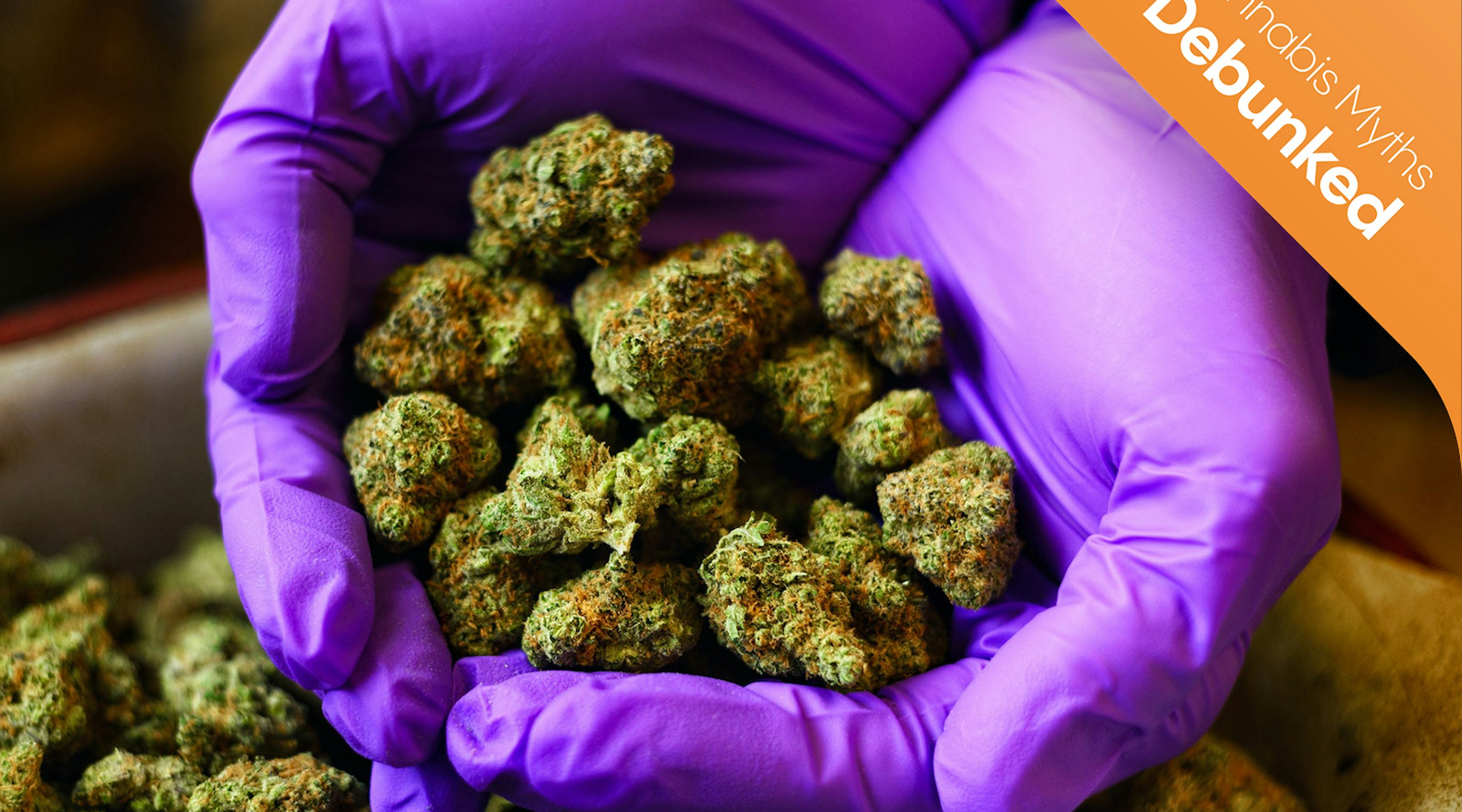Behind the leaf: 5 (more) medical cannabis myths debunked
9 min read
Editorial Team
Contents
Releaf returns with another dose of myth-busting revelations. If you missed our first edition, you can catch up here. One of the big myths of the past was “cannabis will never be legal because they can’t patent a plant”. Well, here we are in 2023 with multiple patents for cannabis-based medicinal products and a burgeoning legal market. Let’s look at some more of the mistakes people make about medical cannabis, and hopefully, if you hear any of these in the future, you’ll feel prepared to debunk it with the evidence.
Myth 6: THC isn’t medical. It only gets you high
THC, or Tetrahydrocannabinol, is the most abundant cannabinoid found in cannabis. Whilst some people may not realise it is medical, it is the most frequently utilised medical part of the cannabis plant. There’s some truth to the notion THC does provide a psychoactive effect, which is dose-dependent and felt less when used regularly, and tolerance builds. For the treatment of some psychological conditions such as depression and anxiety, the psychoactive effects are part of the reason for the medical use.
- An analgesic
- An appetite stimulant
- A nausea reducer
- A sleep aid
- Lowers insulin resistance
- Used for gastrointestinal disorders
- Used to reduce seizure severity and frequency
- Prevents spasms and tremors
- Helpful with feminine reproductive conditions, period pain, endometriosis and polycystic ovaries
- An antidepressant and anti-anxiolytic
Due to cannabis prohibition and the anti-drug campaign that governments have used for over 50 years, THC has gained a bad reputation. When you look at the medical literature, however, there are around 33,000 studies specifically looking at the medical interactions caused by THC.
Thanks to the inordinate amount of CBD product advertising that often strays away from the exact truth, the public has been groomed into believing that CBD is the medical part and THC only gets you high. Strangely, the CBD products being advertised aren’t intended or marketed for medical use and are sold simply as health food supplements.
Both THC and CBD have medical uses, as well as an abundance of other minor cannabinoids that are pharmacologically active but unaccounted for but contribute to a cultivar’s unique, symptom-relieving properties.
Myth 7: Cannabis irradiation completely destroys the quality
Irradiation is a process cannabis flowers sometimes go through as an extra stage of sterilisation. Two main kinds of irradiation used for cannabis flowers are gamma and beta, which are two different wavelengths used to destroy mould, bacteria or any spores that may have been on the cannabis when it was harvested. Unbeknownst to most people, almost everyone will have consumed foods including meats, fruits and vegetables exposed to gamma rays using cobalt-60 to kill bacteria like E. coli.
You may wonder why this is necessary, but there is a good reason. The most vulnerable patients with compromised immune systems are susceptible to infection at a much greater risk than those with healthy functioning immune systems. Patients with cancer, those on chemotherapy or radiotherapy treatment, and those who have undergone an organ transplant or have an autoimmune disorder and are taking immunosuppressive medication, are only prescribed irradiated cannabis to ensure they do not come to any unwanted harm.
There is debate over how much damage occurs to cannabis when it undergoes irradiation treatment. Cannabinoid levels are not affected by the gamma rays, but monoterpenes and sesquiterpenes are. In some cases, the cannabinoid percentage increases slightly because the heat generated by the process also slightly reduces the water content. Water content must be under 10% but is frequently found to be 5-8%.
One of the reasons irradiated medical cannabis has gained a bad reputation from an early stage in the market is some of those first batches of cannabis that came to the UK were effectively old stock and overproduced from other countries which had been sitting around waiting for a buyer. The poor quality was blamed on the fact the product was irradiated, but this was just one element of the truth. If you irradiate old cannabis with a low terpene profile, the quality will certainly not improve.
Some products on the market (that advertising rules forbid us from talking about here) are irradiated whilst maintaining a strain-specific effect and are considered some of the best flowers available out of the choice in all price categories.
Irradiation is not the only way to sterilise medical cannabis; both ozone and plasma can be utilised with special equipment. There are just a few companies that hold the appropriate licences to treat Schedule 2 drugs.
Myth 8: Cannabis use leads to other drugs
The age-old gateway theory just doesn’t stand up when you look at cannabis through the medical lens. The claim that using cannabis will lead you on to other, more harmful, drugs has been dismantled to the point that it is redundant.
Medical cannabis-based treatments are strictly regulated. Everyone involved in the process has a licence and has the interest of the patient in mind (the only kind of person able to be prescribed such drugs).
Cannabis does not, either biologically and chemically, cause the body to want to advance onto something else or something stronger. Medical cannabis is prescribed to treat specific symptoms, and when those symptoms are relieved, patients tend to have the desire to get on with their lives, go to work and spend time with their families. On the contrary to trying other drugs, cannabis has repeatedly been seen as a single replacement for multiple medications that have many more debilitating and potentially life-threatening side effects. Patients who have started taking medical cannabis generally report dramatic improvements after three months of continued use with an overall self-determined improved quality of life.
A 2023 American twins study that has been collecting data for 50 years looked at the difference between 240 pairs of twins' drug use. 40% of the twins had one living in a state with legal cannabis and the other in a state where it was legal. The twin in the legal state used cannabis on average 20% more than their sibling. A wide range of variables was accounted for, and the study concluded that legalisation posed no impact on cannabis dependence or use disorder. The study also noted that there were no changes in their illicit drug use.
Myth 9: Cannabis isn’t medical because you can’t smoke medicine.
This statement reveals a lack of education about how medical cannabis should be administered.
When doctors prescribe cannabis flowers to patients, they are told that they must use a vaporiser to inhale it. As Releaf has covered in the blog "Medical cannabis: Making the switch from smoke to vape", smoking medical cannabis remains prohibited, so there’s an element of truth in that you can’t smoke your medicine - but it’s incorrect that this is the reason cannabis isn’t medical (because it is). Cannabis’ medical status was restored in the UK in 2018 after initially being revoked in 1971.
Releaf has also put together a pretty comprehensive guide to the different medical cannabis products available in the UK and around the world. Take a look and share to help patients and professionals alike understand just how broad medical cannabis products can be to help patients effectively treat a wide range of medical conditions and benefit from symptom relief.
As well as alternative inhalation options, patients often take oral cannabis preparations such as sublingual tinctures and cannabis oil gel capsules. During the patient's consultation with a specialist doctor, it will be determined which kind of cannabis-based medicinal product will be most suitable.
Myth 10: The NHS won’t prescribe medical cannabis because it is unlicensed and it's too expensive
The further we travel along the pathway of legal medical cannabis, the more we learn about the possibilities for receiving the best care for different kinds of patients. One of the biggest and most obvious roadblocks to improving medical cannabis accessibility is limited prescription through the NHS. There are very important and valid safeguarding mechanisms to protect patients and ensure that the medicine doctors prescribe is of the highest quality with the best available supporting evidence to indicate how it should be used for the most satisfactory results. An unfortunate consequence of this course of action is the high cost, upwards of £20 million to £1.2 billion.
Each cannabis product must go through three phases of clinical trials to prove its safety and efficacy for each condition, as well as reveal the side effects and warnings.
Whilst it is true the NHS will generally not prescribe medical cannabis for the average patient, we are starting to see some patients have their private clinic costs reimbursed by the NHS through private funding requests. So far, it has been limited to just two patients, one of whom is diagnosed with terminal stage 4 cancer and has retractable nausea caused by chemotherapy.
Wondering if you’re able to get a medical cannabis prescription in the UK?
Releaf understands that finding a doctor who is registered to prescribe medical cannabis, can be difficult. That's why we offer online consultations with our specialist doctors, as well as a unique medical cannabis card for extra protection and access to the treatment you need. If you're interested in learning more about our services or getting access to medical cannabis treatment, get in touch, and one of our team members will be happy to help.
Share article
Did you like this article?
It is important to seek medical advice before starting any new treatments. The patient advisors at Releaf are available to provide expert advice and support. Alternatively, click here to book a consultation with one of our specialist doctors.
Elevate your wellness with medical cannabis
Get comprehensive care, convenience, and confidence with an all-in-one treatment plan.
Am I eligible?Authors
Editorial Team
Article written by the Releaf Editorial Team, a group of seasoned experts in cannabis healthcare, dedicated to enhancing awareness and accessibility in the field through their wealth of knowledge and experience.
fact checked
Compliance Director
Editorial Policy
All of our articles are written by medical cannabis experts, guided by strict sourcing guidelines, and reference peer-reviewed studies and credible academic research. Our expert clinical team and compliance specialists provide valuable insights to ensure accuracy when required. Learn more in our editorial policy.
Need more help?











